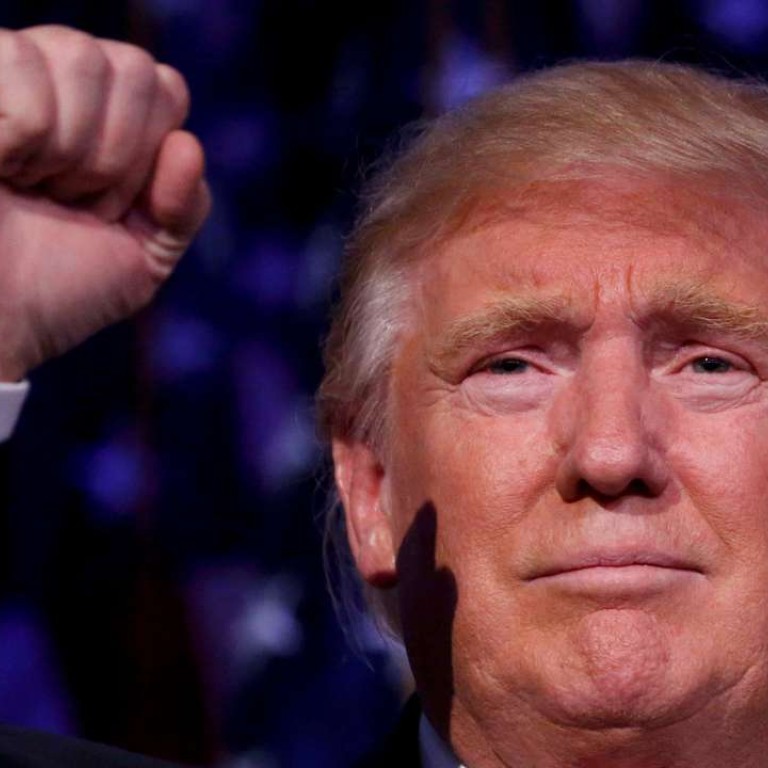
Financial markets begin to doubt Trump – and with good reason
Investors belatedly recognising it’s going to prove difficult, maybe impossible, for the new president to reconcile his nationalist political agenda with his pro-growth economic one
How quickly the “Trump rally” has reached its inflection point.
On Monday, US equities suffered their sharpest daily decline since the beginning of this year.
Having surged to new highs since the victory of Donald Trump in the US presidential election – the Dow Jones Industrial Average broke through the 20,000 point level last week for the first time – a fall of just 0.6 per cent hardly qualifies as a dramatic shift in sentiment.
Yet, psychologically speaking, the reversal was significant.
While the reasons for Monday’s sell-off were numerous – a surge in inflation and political risk across the eurozone, a fall in oil prices and a general sense among investors that the post-election rally has been overdone – the overriding factor behind the recent loss of momentum in stock markets is a reappraisal of the agenda and policies of the Trump administration.
Barely a fortnight after Trump’s inauguration, it has become clear that the issues which the international financial and business community are enthusiastic about differ markedly from those which motivate the president and his advisers.
Trump’s much-criticised decision last week to sign an executive order which bars refugees from entering the US for 120 days and, even more controversially, prohibits citizens of seven Muslim nations from entering America for 90 days has prompted a huge outcry across the US and abroad.
For financial markets, it has exposed the strong protectionist and nationalist instincts of senior members of the Trump administration.
Barely a fortnight after Trump’s inauguration, it has become clear that the issues which the international financial and business community are enthusiastic about differ markedly from those which motivate the president and his advisers.
These proclivities were thrown into sharp relief on Tuesday when Peter Navarro, Trump’s chief trade negotiator, told the Financial Times that Germany “continues to exploit other countries in the EU with an ‘implicit Deutsche Mark’ that is grossly undervalued.”
Trump echoed his comments by accusing China and Japan of “play[ing] the money market, play[ing] the devaluation market, while we sit here like a bunch of dummies”.
Investors and traders are now asking themselves whether they misread the priorities of the new administration which, for the time being, is more focused on economic protectionism and national security issues than stimulating the US economy through tax cuts, infrastructure spending and deregulation – the campaign pledges of the new president which have underpinned the so-called “Trumpflation” trade.

As ADM ISI, a London-based brokerage, noted in a report on Monday, Trump “continues to issue orders/edicts that are not about boosting the economy, which is what markets were hoping for and waiting to hear about, [but instead] which put the US at loggerheads with much of the rest of the world.”
In a sign of the extent to which the Trump rally has faltered, the dollar index – a gauge of the greenback’s performance against a basket of its peers – dipped below 100 this week for the first time since the election.
The fear, as Convergex, a US brokerage, rightly noted in a report on Monday, is that the divisive non-economic issues that are dominating the administration’s first two weeks in office will undermine Trump’s ability to gain the necessary political support for the reflationary economic policies markets expect him to implement.
[Trump] continues to issue orders/edicts that are not about boosting the economy, which is what markets were hoping for and waiting to hear about, [but instead] which put the US at loggerheads with much of the rest of the world
Put simply, investors are belatedly recognising that it is going to prove difficult – and may even be impossible – for Trump to reconcile his nationalist political agenda with his pro-growth economic one.
These concerns are amplified by the conspicuous lack of detail about Trump’s much-anticipated fiscal stimulus package. The president’s tax-cutting and deregulatory agenda is a big unknown which is fuelling volatility in markets.
“Capital markets really want to hear specifics – and the more, the better – about Trump’s economic plans, but that simply hasn’t happened yet,” Convergex notes.
Still, while the last few weeks have been something of a reality check for investors, Trump’s executive orders (and his much-publicised tweets) are not the only factor shaping market sentiment.
On Wednesday, the publication of robust US employment and manufacturing data led to a renewed increase in the dollar and cemented expectations that the Federal Reserve will raise interest rates in the coming months, possibly as early as next month.
Downward pressure on the greenback – the dollar index is down more than 3 per cent since January 3 – makes it easier for the Fed to raise rates.
While investors may be having doubts about Trump’s intentions, the Fed’s are becoming clearer.
A stronger dollar, however, will only accentuate the protectionist and mercantilist instincts of the Trump administration, fuelling concerns about Trump’s economic policies.
Nicholas Spiro is a partner at Lauressa Advisory

